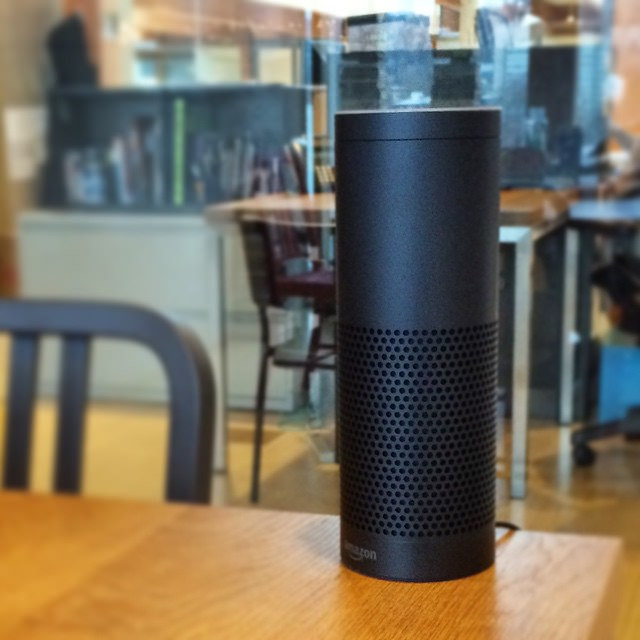 NEWS
NEWS
 NEWS
NEWS
 NEWS
NEWS
Alexa voice search is the pride of Amazon Echo, the e-tailer’s smart home hub. It’s convenient to use, but unfortunately, this ease of use could also be the device’s greatest downfall.
National Public Radio (NPR) delves deep into how the Amazon Echo works during its Weekend Edition in late February. During the program, an ad for Amazon Echo was played to demonstrate how Alexa works. Throughout the interview, guest Hiawatha Bray explained what else Alexa can do.
Unfortunately, the constant mention of Alexa woke up the Amazon Echoes of NPR listeners. The listeners wrote to the program informing them their Amazon Echoes were listening during the program, and some of the devices went a little crazy.
Because of this, the show did a follow up and host Rachel Martin even dedicated it to Alexa.
“OK. Go ahead and turn up the volume because this update is for you, Alexa. Last week, we talked about Alexa, the voice-activated assistant that operates on a speaker sold by Amazon called the Echo. The technology is Amazon’s way of connecting to your home as part of a future where you walk into your house and you say – out loud – turn off the alarm. Dim the lights. Preheat the oven. Well, some of you out there already own an Amazon Echo, and our story activated your Alexas. I guess her ears were burning.
“Listener Roy Hagar wrote in to say our story prompted his Alexa to reset his thermostat to 70 degrees. It was difficult for Jeff Finan to hear the story because his radio was right next to his Echo speaker, and when Alex heard her name, she started playing an NPR News summary. Marc-Paul Lee said his unit started going crazy too and wrote in to tell us this – let’s just say we both enjoyed the story. So Alexa, listen up – we want you to pledge to your local member station. You hear me? Lots and lots of money. Did you get that, Alexa?” – Rachel Martin
On one thread, one commenter stated that the same thing happens when the Amazon Echo commercial plays on TV. Also, if you happen to live with someone named Alex/Alexandra/Alexander or have a guest with the said names, the device could be triggered when you call out to your friend.
First, the problem here is that Alexa doesn’t have the ability (yet) to identify who is speaking or determine whether the person giving orders is authorized to give orders. Which means anyone with access to your Amazon echo could order anything from your Amazon.com account.
The second problem is that the trigger word ‘Alexa’, sounds common enough that the device can confuse it when another name is called.
Guests at your home can easily mess with your Amazon Echo or smart home devices that can be controlled by the device. From constantly activating the voice assistant, to messing with the smart lights, thermostat, door lock and more, to using it to order off of your Amazon.com account when you’re not around. And with the recent introduction of the Capital One Alexa skill, unauthorized persons could learn learn how much money is in your bank account unless you utilize a 4-digit Personal Key.
Also, Amazon added two new Alexa-enabled devices, the Amazon Tap and Echo Dot, which means more devices waiting for the ‘wake word’ although the Amazon Tap would need to be pressed first before it starts to listen in.
The first thing you can do is to change the wake word. Currently, you can only choose from Alexa, Amazon and Echo. To do this, open the Alexa app. Open the left navigation panel > Settings > select the Amazon Echo you want to alter from the menu > scroll down > select Wake Word. Use the drop-down menu to select a wake work (Alexa, Amazon or Echo) then select Save. The light ring on the Amazon Echo flashed orange briefly, letting users know that a change has been made. Though the options for wake word is limited, you can at least change it Echo so it won’t be triggered when an Amazon commercial comes on or when someone says Amazon or Alexa.
To prevent anyone from shopping using your Amazon account, remember to put in place a 4-digit confirmation code. Even when items have been placed in the Amazon shopping cart, shoppers will not be able to purchase anything if the 4-digit confidential code is not provided.
To add a confirmation code, open the Alexa app, go to Settings > select Voice purchasing. From there you will see Purchase by voice and below it Require confirmation code. Enter a 4-digit code and save changes.
To play it super safe, you can disable voice purchasing entirely. Just go to Settings > Voice Purchasing > toggle the switch to off in Purchase by voice and you’re done.
Hopefully these steps will give Amazon Echo, Fire TV, and future Amazon Tap and Echo Dot users some peace of mind.
THANK YOU